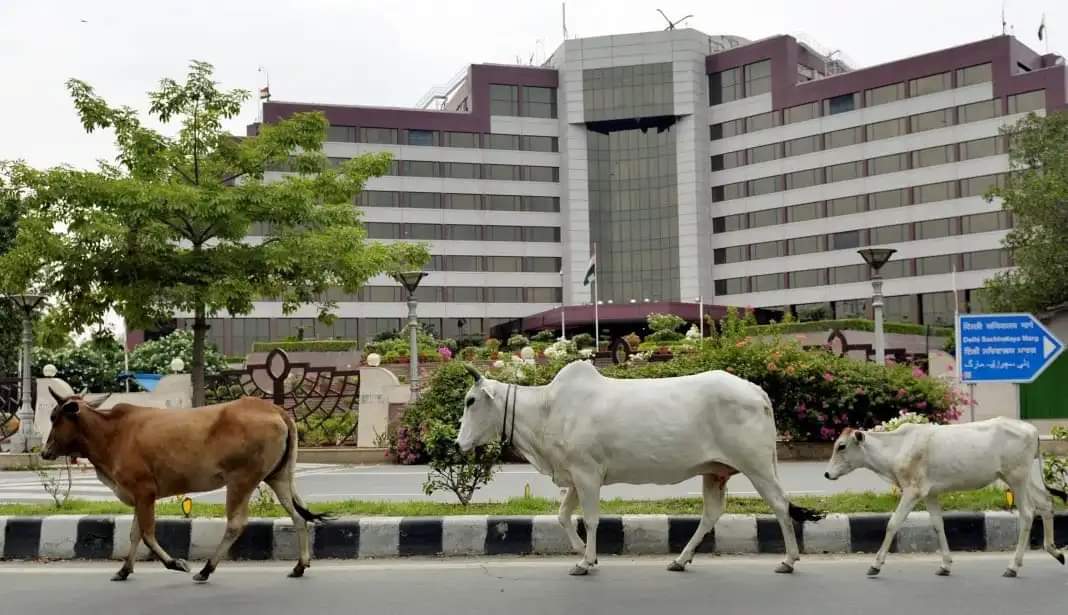Farmers need more than just ‘shraddha’ to keep cattle, says cow commission chief Kathiria
Rashtriya Kamdhenu Aayog’s head Vallabhbhai Kathiria tells ThePrint they plan to give away healthy cows to farmers, while sick ones will be kept at gaushalas.
By-NEELAM PANDEY
Excerpt from The print.
PASHUDHAN PRAHAREE NETWORK
28 September, 2019
Farmers need more than just ‘shraddha’ to keep cattle, says cow commission chief Kathiria
A herd of cows walk past Delhi Sachivalaya Road, in New Delhi | PTI
New Delhi: Rashtriya Kamdhenu Aayog’s head Vallabhbhai Kathiria Saturday said that merely “shraddha“ (reverence) and “aastha” (faith) for cows is not enough for farmers to keep them and that they should be made aware about their economic benefits also to address the problem of stray cattle and overcrowded gaushalas (cow sheds).
“For instance, cow urine and cow dung can be used as bio-pesticides and fertilizers. Cattle can also become part of zero-budget or low-budget farming,” Kathiria told ThePrint.
Kathiria said the commission is looking at framing guidelines for allowing gaushalas to give away cows, calves and bulls to farmers by providing incentives to them — an experiment that was done by him in Gujarat. Kathiria, who is a former BJP MP from Gujarat, had earlier headed the Gujarat State Gauseva Aayog.
“We need to change the mindset of the people (those running gaushalas), who out of reverence don’t believe in using the milk of the cows they keep or don’t want to sell the by-products. We need to change this,” Kathiria said.
The Aayog, which functions under the newly-formed Animal husbandry ministry, was set up by the Narendra Modi government in February for the purpose of conservation and protection of cattle population in the country.
Healthy cows to be given to farmers, sick ones to cowsheds
Under the proposed plan — which will be taken up for consultation with gaushalas, farmers and state governments — healthy cows will be given to individuals and farmers, while sick, ageing cows and bulls, which require medical attention, will be kept in gaushalas, he said.
Cows and bulls that are rounded up from the streets and are not fit to be milked will be kept at gaushalas and can be given up for adoption once their health improves, said Kathiria.
“In case, a cow that has been adopted by a farmer starts to age or falls sick, it can once again be brought back to the cow sheds,” he said.
Kathiria said that farmers should also be made aware that cows are beneficial as they could earn more by selling their milk, urine and gobar (cow dung).
He said that desi cows deliver A2 quality milk, which is sold for anything between Rs 100-120 in the market, and if a farmer can even get Rs 50-60 by keeping such a cow, it will be beneficial for them.
“The idea is to ensure that not only farmers benefit from this exercise but if these healthy bulls and cows are handed over to farmers, it will also save them from abuse,” he added.
‘When farmers adopt cattle, they should be given training’
Kathiria cited the example of Uttar Pradesh, which under Chief Minister Yogi Adityanath, is implementing a scheme in which farmers are given money for maintaining cows handed over to them from government-run shelters.
Under the scheme, a farmer is paid Rs 30 per cow a day. “The guidelines will ensure that there are proper checks and balances to ensure these cows don’t end up getting slaughtered. At the same time, a small maintenance amount can be provided to them,” said Kathiria.
“Not only farmers, but individuals should also be encouraged to adopt cows, especially by making them aware and by making the process simple,” he added.
The commission is also trying to ensure that when farmers adopt cattle from gaushalas, they are provided adequate training to maintain them.
Besides, it is working on a plan to set up gaushalas, similar to the one built in Gwalior, which operates on a PPP model and produces phenyl, pesticides using cow dung and urine.



